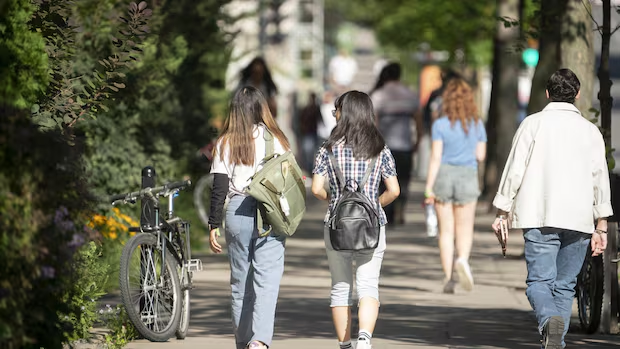
Listen to this article
Estimated 4 minutes
The audio version of this article is generated by text-to-speech, a technology based on artificial intelligence.
Ontario’s community colleges could cut more programs of study and see their already significant financial troubles worsen now that the federal government plans to admit only 155,000 international students to the country next year, according to groups who track the file.
That represents half of the 305,900 international student cap the government had planned for 2026, before it revised targets downward yet again in its latest report on immigration levels, which was released Tuesday alongside the federal budget.
It lays out a plan to cut the number of temporary residents significantly, and to admit only 155,000 students next year, and 150,000 each in 2027 and 2028.
“As Ontario responds to a battery of previous changes, these budget cuts present further disruption at a time when the sector has already cut $1.8 billion, suspended 600 programs and eliminated 8,000 positions,” wrote Maureen Adamson, CEO of Colleges Ontario, in a statement.
Colleges in Ontario, especially, have chased the higher revenues of international student tuition for years, trying to make up for a longstanding freeze on domestic tuition and years of underfunding by the Ontario government.
Many were using international tuition to offset high costs of programs for Canadian students, they say.
“The trades and health care programs are expensive,” explains Pari Johnston, CEO of Colleges and Institutes Canada.
But college after college began cutting dozens of programs earlier this year to deal with the jolt of the last big federal immigration policy change in the fall of 2024, which started to close the taps on work and study permits.
Asked Tuesday how institutions would cope financially with another lowering of the cap on international students, Minister of Finance and National Revenue Francois-Philippe Champagne said the government had to bring immigration down to sustainable levels.
“I think Canadians understand we had reached our capacity, or sometimes exceeded our capacity,” he said. “If you welcome people in your country, you have a duty to allow them to find a place to live, to go to school, or get service in hospital.”
He pointed to other aspects of the budget, which aim to attract international researchers to Canadian universities.
Low student visas already in 2025
Alex Usher and his team at the consulting firm Higher Education Strategy Associates spent hours dissecting the budget and said at first he felt the immigration targets would mean another financial hit to post-secondary education.
But as they dug further, he said immigration data shows Canada hasn’t even admitted 150,000 international students in the current year, in part because students abroad heard the message that the country was no longer as open.
The new lower targets for 2026, 2027 and 2028 mean institutions can no longer hope to regain international students in years to come, Usher says.
“I think a lot of institutions assumed that what happened this year was the low point and they’d be able to bounce back, and so maybe they didn’t cut some of their programs as hard as they maybe should have,” says Usher.
Usher says several colleges also felt they could influence the federal government on its visa and post-graduate work program, but the government doesn’t appear to be interested.
“I think institutions are going to be forced into greater and longer-term cuts,” he said.
A comprehensive report Usher’s firm produces each year shows Ontario spends only about 40 per cent of the Canadian average on its colleges and Usher doesn’t see that changing. Colleges lose money on most domestic students who enrol.
Post-secondary consultant and researcher Alex Usher, president of Higher Education Strategy Associates, is pictured at his Toronto office on Tuesday, January 28, 2025. (Mark Bochsler/CBC)
A statement from the office of Ontario’s minister for colleges and universities, Nolan Quinn, says the government is working with post-secondary institutions to review and update their funding model but also remarked on the new federal immigration levels.
“The federal government’s decision to unilaterally proceed with another change impacting international students continues to force post-secondary institutions in Ontario, and across the country, to make difficult decisions regarding their long-term success and sustainability,” wrote Nolan’s press secretary, Bianca Giacoboni.





